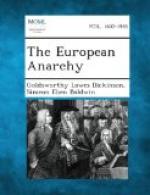We know, of course, now, that the arrangement for the partition was actually embodied in secret clauses in the Anglo-French treaty.]
[Footnote 2: According to M. Yves Guyot, when the Kaiser was actually on his way to Tangier, he telegraphed from Lisbon to Prince Buelow abandoning the project. Prince Buelow telegraphed back insisting, and the Kaiser yielded.]
[Footnote 3: See Bourdon, “L’Enigme Allemande,” Chap. II. This account, by a Frenchman, will not be suspected of anti-French or pro-German bias, and it is based on French official records.]
[Footnote 4: “L’Allemagne avant la guerre,” p. 216.]
[Footnote 5: “L’Allemagne avant la guerre,” p. 235.]
[Footnote 6: See above, p. 63.]
[Footnote 7: This view is reaffirmed by Baron Beyens in “L’Allemagne avant la guerre,” p. 29.]
[Footnote 8: See above, p. 79.]
[Footnote 9: Above, p. 111.]
16. The Last Years.
We have reached, then, the year 1913, and the end of the Balkan wars, without discovering in German policy any clear signs of a determination to produce a European war. We have found all the Powers, Germany included, contending for territory and trade at the risk of the peace of Europe; we have found Germany successfully developing her interests in Turkey; we have found England annexing the South African republics, France Morocco, Italy Tripoli; we have found all the Powers stealing in China, and in all these transactions we have found them continually on the point of being at one another’s throats. Nevertheless, some last instinct of self-preservation has enabled them, so far, to pull up in time. The crises had been overcome without a war. Yet they had, of course, produced their effects. Some statesmen probably, like Sir Edward Grey, had had their passion for peace confirmed by the dangers encountered. In others, no doubt, an opposite effect had been produced, and very likely by 1913 there were prominent men in Europe convinced that war must come, and manoeuvring only that it should come at the time and occasion most favourable to their country. That, according to M. Cambon, was now the attitude of the German Emperor. M. Cambon bases this view on an alleged conversation between the Kaiser and the King of the Belgians.[1] The conversation has been denied by the German official organ, but that, of course, is no proof that it did not take place, and there is nothing improbable in what M. Cambon narrates.
The conversation is supposed to have occurred in November 1913, at a time when, as we have seen,[2] there was a distinct outburst in France of anti-German chauvinism, and when the arming and counter-arming of that year had exasperated opinion to an extreme degree. The Kaiser is reported to have said that war between Germany and France was inevitable. If he did, it is clear from the context that he said it in the belief that French chauvinism would produce war.




